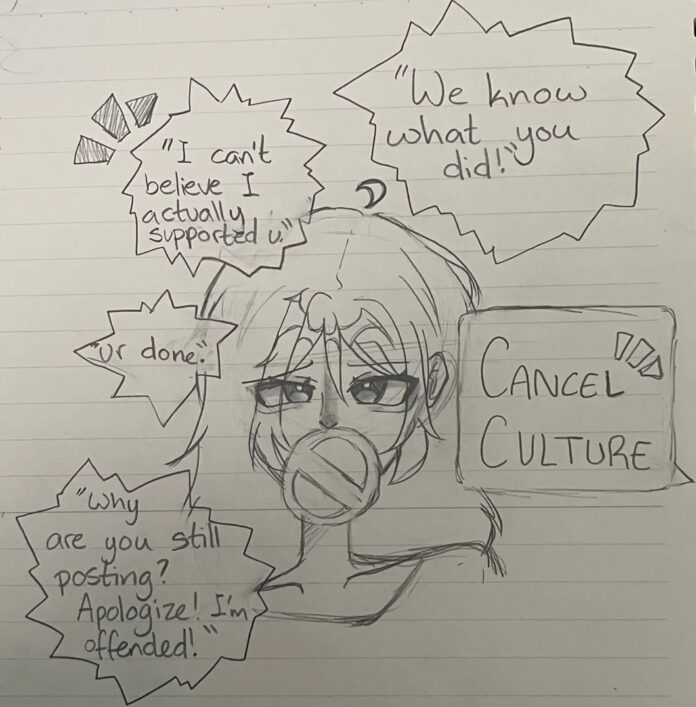In the age of social media, where someone’s digital footprint can be checked within a click of a mouse, the term “cancel culture” has been gaining popularity.
Coined in the late 2010s, “canceling” someone generally means unfollowing and “hating on them” on social media due to something they said or an action they committed that’s deemed as controversial or offensive. Though they usually begin online, these call-outs often extend into offline spaces.
Countless celebrities have had their lives ripped away from them because of one small mistake— like their past rising from the dead to haunt them.
“If you get properly canceled, your life is basically over.”
—Savannah Shamamba, Grade 10 student at ICSA.
What Goes Around Comes Around: #CancelKanye
Kanye West, who now goes by Ye, is a well known rapper, singer-songwriter has experienced cancel culture first hand. In the prime of his career, he’d partnered up with billion dollar companies such as Adidas, Balenciaga, and Gap. However, due to his recent behavior, these companies have cut ties with him and he’s been canceled.
This came after several public mistakes. He posed at his YZY runway show during Paris Fashion Week while wearing a “White Lives Matter” shirt, a catchphrase made popular by fascist and neo-Nazi organizations. He also announced via Twitter (now “X”) that he was going to “Go death con 3 on JEWISH PEOPLE.” These racist and antisemitic remarks led to a lot of backlash, which led Instagram and eventually Twitter to suspend his accounts.

This is an example of someone who should be canceled. As 10th grader Mohamed Bangura says, “Kanye’s too far gone… I don’t think he can be saved anymore. I don’t think that he can make a comeback because people don’t just forget the things you’ve said.”
Ye’s net worth plummeted from $6.6 billion in 2021 to an estimated $410 million by 2023 as a result of controversies and the end of several important collaborations.
It’s All a Popularity Contest
Celebrities get canceled for multiple different reasons, some being the fact that people online just want drama. This is ultimately what makes cancel culture so controversial.
Certain creators also get away with more due to the fact that they have more followers, bias, and are more conventionally attractive; this is recognized by most ICSA students that were interviewed for this story. At this point, it’s become a popularity contest where “your fate can be dedicated solely based on your looks or status online.”
“It basically just tells us about how our society works; you can get away with so much if you’re just attractive and popular. A lotta people don’t care about the mistakes celebrities make at all,” says one anonymous grade 10 student.
Not only does canceling happen with celebrities, but at schools too. Young people will see celebrities getting canceled and mimic their behavior.
Being canceled at such a vulnerable age can have many negative effects. Teenage anxiety, depression, trauma, and suicidal thoughts and actions can all be caused by being canceled. At a time when peer relationships are crucial, social rejection caused by cancellations can be painful.
Cancel Culture & Social Media
Social media is a great way for people to express themselves and their differing opinions; however, cancel culture may ruin that safety and take away that freedom.
“Teenagers become more and more stupid due to social media,” says an anonymous student. “They have to follow a certain trend to feel okay…They have to accept something they don’t necessarily believe in.”
Certain students think that some internet users are too sensitive to opposing opinions, especially online—which can cause a lack of free speech. As one surveyed student points out, “They talk about free speech and the moment you don’t say something ‘correct,’ they cancel you.”
Tenth grader Mwamvita Adol Barnabas weighs in by saying, “Online is a place where you can explore a lot of different opinions. You as a human being know you’re gonna face that on the internet and not everybody’s gonna agree with what you’re saying; and you have to prepare for that you know?”
“In order to speak, you have to risk being offensive. Just because someone is offended doesn’t mean you can’t speak. That’s morally correct.”
—Surveyed grade 12 student
The Controversy of Cancel Culture
Cancel culture is a very controversial subject, no matter how you look at it; but as teenagers, we should reflect on our engagement on social media and how it affects us and the people around us.
The celebrities that have been canceled basically had their reputations ruined. So many celebrities had their fame stripped away in a matter of days, but what about people that aren’t a prominent figure on the internet? What repercussions do they face?
Many ICSA students believe that cancel culture is healthy, as it holds people accountable for bad behavior. As 10th grader Raphael Bescond says, “It makes sure that the people who are some of the most powerful people on Earth are still able to suffer the consequences of their own words and actions.”
While this is true, there are some negative aspects of cancel culture as well. The fear of being canceled by saying the wrong thing prevents people from engaging in important conversations. It discourages freedom of speech and doesn’t allow for people to learn from their mistakes and grow as people. After all, shouldn’t we be able to change without being cast out of society?


